 Petzlover
Petzlover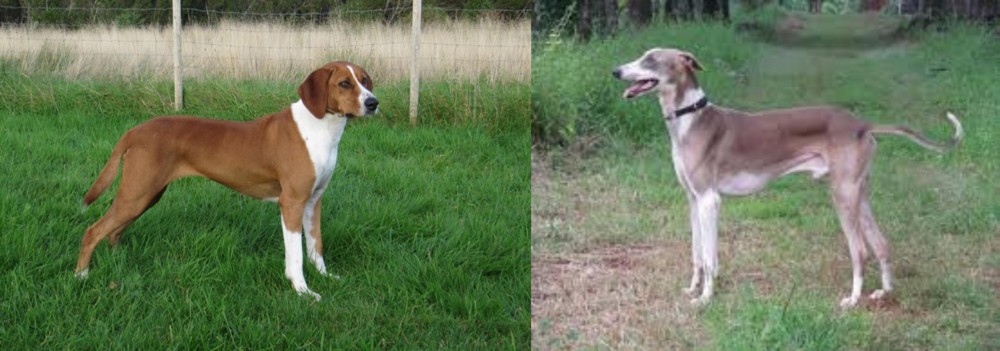 Hygenhund is originated from Norway but Mudhol Hound is originated from India. Hygenhund may grow 11 cm / 4 inches shorter than Mudhol Hound. Both Hygenhund and Mudhol Hound are having almost same weight. Both Hygenhund and Mudhol Hound has almost same life span. Both Hygenhund and Mudhol Hound has almost same litter size. Both Hygenhund and Mudhol Hound requires Moderate Maintenance.
Hygenhund is originated from Norway but Mudhol Hound is originated from India. Hygenhund may grow 11 cm / 4 inches shorter than Mudhol Hound. Both Hygenhund and Mudhol Hound are having almost same weight. Both Hygenhund and Mudhol Hound has almost same life span. Both Hygenhund and Mudhol Hound has almost same litter size. Both Hygenhund and Mudhol Hound requires Moderate Maintenance.
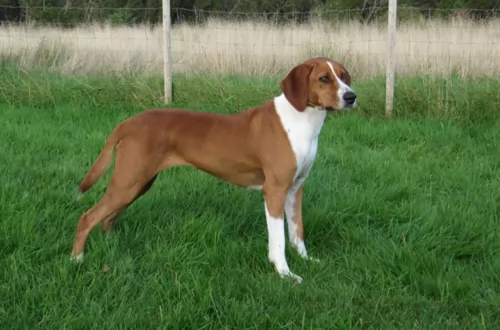 The Hygenhund is a hound from Norway that was developed in the early 1800’s by the Norwegian breeder Hygen. It was developed for hunting small game such as fox, rabbit, hare or racoon. It is known for its endurance and ability to survive travel across vast artic land without fatigue. It was developed by crossing several Norwegian hounds with ones from England and Germany. This includes basset hounds, holsteiner hounds, beagles, Bloodhounds, Scandinavian hounds and English Pointers. The resulting Hygehound is a scent hound whose popularity fell in the 20th century. Most of the remaining dogs today are located in Norway. The Norwegian Kennel Club and the UKC have both recognized the breed yet its numbers remain low. Even at that the breed today remains a great hunting dog but it is also a great companion or family dog.
The Hygenhund is a hound from Norway that was developed in the early 1800’s by the Norwegian breeder Hygen. It was developed for hunting small game such as fox, rabbit, hare or racoon. It is known for its endurance and ability to survive travel across vast artic land without fatigue. It was developed by crossing several Norwegian hounds with ones from England and Germany. This includes basset hounds, holsteiner hounds, beagles, Bloodhounds, Scandinavian hounds and English Pointers. The resulting Hygehound is a scent hound whose popularity fell in the 20th century. Most of the remaining dogs today are located in Norway. The Norwegian Kennel Club and the UKC have both recognized the breed yet its numbers remain low. Even at that the breed today remains a great hunting dog but it is also a great companion or family dog.
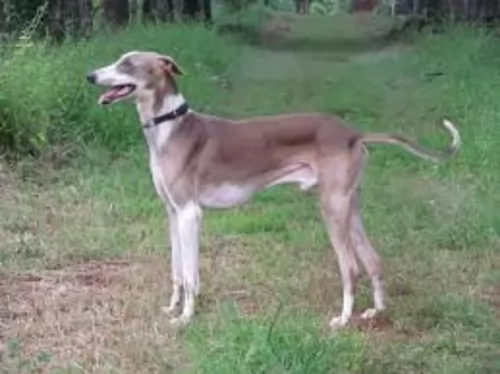 This seems to be the breed of many names. The Mudhol Hound comes from India and has been called the Caravan Hound, the Pashmi, the Karvanit, the Karwaani and the Pisuri Hound. Like so many other Indian breeds, the Mudhol Hound bears a strong look of the Greyhound. He is a sight hound and as such is lean and fast. He is ancient, healthy and loves his people.
This seems to be the breed of many names. The Mudhol Hound comes from India and has been called the Caravan Hound, the Pashmi, the Karvanit, the Karwaani and the Pisuri Hound. Like so many other Indian breeds, the Mudhol Hound bears a strong look of the Greyhound. He is a sight hound and as such is lean and fast. He is ancient, healthy and loves his people.
The ancestors of the Mudhol include the hounds bred by the tribes of Bedar near Mudhol and Halagali. In Maharashtra the Maratha warriors were also breeding hounds which are included in the Mudhol Hound lineage. It is believed that there is Tazi and Saluki heritage in the Mudhol as well.
All of these Indian hounds were good at guarding, hunting and as companions. Then the King of Mudhol began to breed them specially for hunting and succeeded in developing a sleek, slender dog. The King of England at the time, George V, was so impressed he dubbed them the Hounds of Mudhol.
The Mudhol Hound hunts rabbits and other small animals with their incredible sight. No matter if the breed was on a postage stamp in 2005 and is a great family companion, it is first and foremost a working dog. He was specifically bred for the tough working conditions in the mountains of India. They are courageous, loyal and graceful. They are committed to their people but a little standoffish with anyone else and make good guard dogs.
They were used by the Indian Army as border protection and surveillance dogs. They use them for testing of their veterinary corps. They have been deployed by the Army in Kashmir and Jammu in 2017, just as they were centuries ago. They were effective at taking down soldiers and horses alike.
They were also chosen for breeding at the Canine Research and Information Centre, part of the Karnataka Veterinary, Animal and Fisheries Sciences University in Bidar. With a very high prey drive they can get along with other dogs their size but cannot be trusted with smaller pets.
The Indian National Kennel Club lists them as the Mudhol Hound while the Kennel Club of India recognizes them as the Caravan Hound.
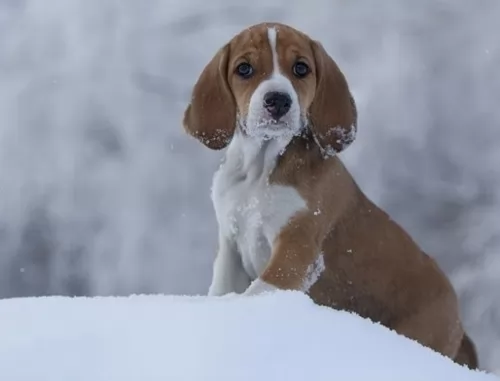 The Hygenhund has a solid rectangular and compact body with muscular and compact legs and paws. Their heads are shaped like a triangle with dark eyes and a broad skull. The muzzle and neck are long and the topline is even. They carry their tail high, but they do not curl it over their back. They are a medium sized dog with short hair. They have an overabundance of energy and get bored easily. They can come in black with chestnut or white markings, yellow and red, chestnut without or with black markings.
The Hygenhund has a solid rectangular and compact body with muscular and compact legs and paws. Their heads are shaped like a triangle with dark eyes and a broad skull. The muzzle and neck are long and the topline is even. They carry their tail high, but they do not curl it over their back. They are a medium sized dog with short hair. They have an overabundance of energy and get bored easily. They can come in black with chestnut or white markings, yellow and red, chestnut without or with black markings.
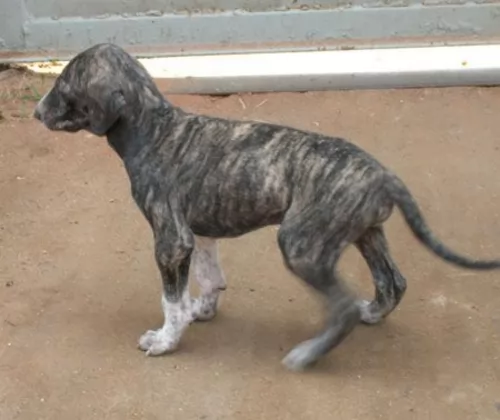 The Mudhol Hound is a good looking sight hound. Slender, sleek, muscular. They have narrow, long heads with a muzzle that tapers. They have long and powerful jaws with a large black nose. Their eyes are oval, large and brown with a look that pierces, and they have long, muscular, and clean shoulders. The legs are straight, long and strong with a broad, muscular, long back. Like most sight hounds when you seen them coming at you straight on, they have the appearance of being one dimensional.
The Mudhol Hound is a good looking sight hound. Slender, sleek, muscular. They have narrow, long heads with a muzzle that tapers. They have long and powerful jaws with a large black nose. Their eyes are oval, large and brown with a look that pierces, and they have long, muscular, and clean shoulders. The legs are straight, long and strong with a broad, muscular, long back. Like most sight hounds when you seen them coming at you straight on, they have the appearance of being one dimensional.
There are two types of coat and many acceptable colors. The coat can be silky on the tail, legs and ears or it can be completely smooth from head to toe. The coat can be grey, black, cream, red, fallow, and fawn. It can also be one of these colors and a small amount of shite blended it.
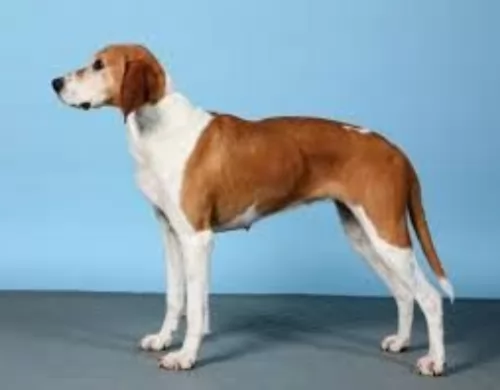 1. Children friendliness – The Hygenhund is very friendly to children and love to play with them.
1. Children friendliness – The Hygenhund is very friendly to children and love to play with them.
Stamina, intelligence and ability to endure cold climates.
Very adaptable in some ways – enduring cold climates for instance. However, they need a large yard or area to run in. They are not as adaptable in an apartment.
The Hygenhund is very intelligent and a quick learner. They love learning new things.
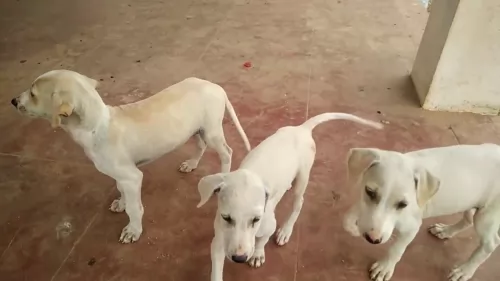 Like so many of the old breeds raised in a lot of isolation, the Mudhol is a very healthy breed. There are no genetic illnesses and they have a long line of dogs able to deal with the weather in India and avoid any sickness. However, they do have a few conditions they are prone to.
Like so many of the old breeds raised in a lot of isolation, the Mudhol is a very healthy breed. There are no genetic illnesses and they have a long line of dogs able to deal with the weather in India and avoid any sickness. However, they do have a few conditions they are prone to.
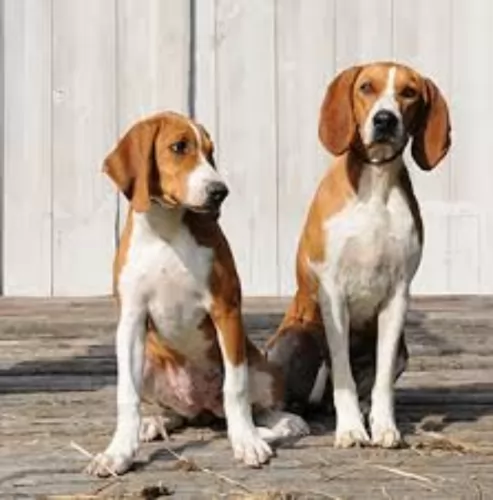 Since the Hygenhund is such a high energy working dog feed a high quality food. Feed 3-4 times a day for a total of 2.3 cups.
Since the Hygenhund is such a high energy working dog feed a high quality food. Feed 3-4 times a day for a total of 2.3 cups.
Again this is a high energy dog. Feed a high protein good quality dog food twice a day for a total of 3-4 cups.
Good speed and stamina. Good in cold climates.
The Hygenhund needs plenty of exercise to dissipate all its working energy. They will excel at field trials, lure coursing, fly ball, tracking, and agility.
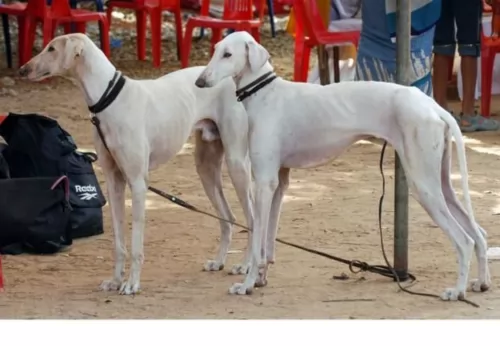 The Mudhol puppy needs a high quality dry food. They should eat three to four times a day in smaller portions. A total of 3 to 3.5 cups per day.
The Mudhol puppy needs a high quality dry food. They should eat three to four times a day in smaller portions. A total of 3 to 3.5 cups per day.
The adult Mudhol should eat about two and a half cups of high quality dry food twice a day. Do not overfeed the Mudhol and don’t let him run right after eating.
Outstanding speed and stamina
This is a high energy, active dog that needs a lot of space and exercise. She needs to be able to run freely as long as she wants at least a couple times a day. He has incredible endurance and a very high prey drive. They must be in a fenced area unless on a leash. They are great at lure coursing, fly ball and agility.